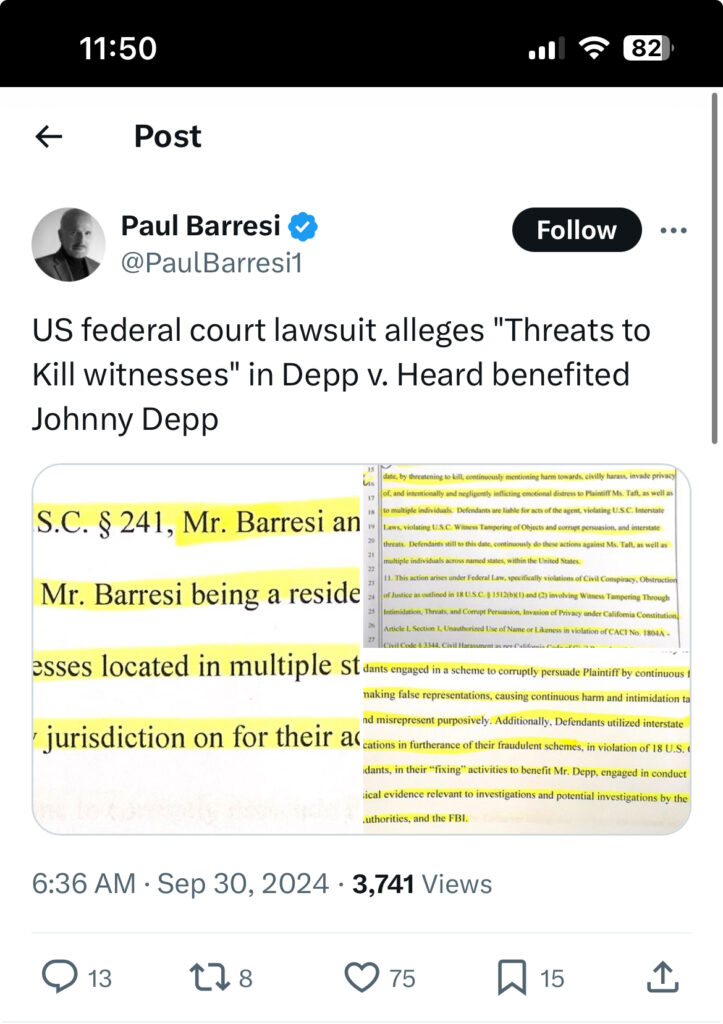The entertainment industry, known for its glitz and glamour, is also infamous for its secrets and scandals. Recent legal proceedings against Paul Barresi and Adam Waldman, two prominent Hollywood fixers closely associated with Johnny Depp, have brought to light the darker aspects of this world. Filed in federal court under Case Number 5:24-cv-01930-TJH-DTB, the lawsuit encompasses serious allegations that could have significant implications for both the defendants and the industry at large.
The Rise of Fixers in Hollywood
Hollywood fixers have long operated behind the scenes, serving as crisis managers for celebrities seeking to navigate the turbulent waters of public perception and legal issues. They are the unsung heroes—or sometimes villains—who tackle scandals, manage public relations disasters, and assist clients in handling sensitive legal matters. Paul Barresi and Adam Waldman have been instrumental figures in this realm, with Waldman being a lawyer and Barresi having a reputation as a fixer with a checkered past.
However, the role of fixers is often controversial. While they can shield their clients from negative press and legal ramifications, their methods may sometimes skirt the edges of legality, raising ethical questions about their tactics. The current lawsuit against Barresi and Waldman exemplifies these ethical dilemmas.
Key Allegations in the Lawsuit
The lawsuit brings forth a multitude of allegations, each highlighting potentially unlawful behavior. The following key charges stand out:
- Civil Conspiracy: Central to the lawsuit is the allegation of civil conspiracy, wherein the plaintiff asserts that Barresi and Waldman colluded to engage in illegal activities. Proving civil conspiracy requires demonstrating that the defendants acted in concert to commit unlawful acts, a challenge given the often covert nature of fixer operations.
- Obstruction of Justice (18 U.S.C. § 1512): The lawsuit accuses the defendants of obstructing justice by interfering with witness testimony. This charge carries significant weight under federal law, and if proven, it could lead to severe civil and criminal penalties.
- Invasion of Privacy (California Constitution, Article I, Section 1): The plaintiff alleges that Barresi and Waldman unlawfully invaded their privacy, a serious violation in California. This claim underscores the delicate balance fixers must maintain between protecting their clients and respecting the privacy rights of others.
- Civil Harassment (California Code of Civil Procedure § 527.6): The claim of civil harassment suggests that the defendants engaged in a pattern of behavior that alarmed or distressed the plaintiff. This charge emphasizes the importance of understanding the impact of their actions on the emotional well-being of others.
- Negligent and Intentional Infliction of Emotional Distress: The plaintiff seeks compensation for the emotional distress allegedly caused by Barresi and Waldman’s actions. If the court finds the defendants acted recklessly or with intent to harm, they could face significant damages.
- Racketeering and RICO Violations (18 U.S.C. § 1962): One of the most serious allegations involves violations of the RICO Act, typically associated with organized crime. This charge suggests that the defendants may have engaged in a systematic pattern of illegal behavior, which, if proven, could lead to treble damages for the plaintiff.
- Destruction or Alteration of Records (18 U.S.C. § 1519): The lawsuit alleges that Barresi and Waldman tampered with records to obstruct justice. Evidence of such actions could lead to severe repercussions under federal law.
The Call for Legislative Reform
The lawsuit does not merely seek damages for the plaintiff; it also advocates for significant changes in California law. The plaintiff argues for new legislation that would enhance protections against coercion and intimidation in legal matters, reflecting concerns similar to those addressed by laws in New York. This call for reform highlights a growing recognition of the vulnerabilities faced by individuals in the arts and entertainment sectors, particularly when dealing with powerful figures and their fixers.
The Broader Implications for Hollywood
The legal challenges facing Barresi and Waldman could have profound implications for the future of Hollywood fixers and their practices. A verdict against the defendants could set a precedent, forcing fixers to reevaluate their tactics and operate within stricter ethical guidelines. Additionally, it could inspire more victims to speak out against coercion and intimidation in the industry, fostering a culture of accountability.
The lawsuit also raises questions about the responsibilities of celebrities who rely on fixers for crisis management. As the case unfolds, public opinion may shift, leading celebrities to reconsider their relationships with fixers who engage in questionable practices.
Potential Consequences for the Defendants
If the court finds Barresi and Waldman liable for the allegations, they could face substantial financial penalties, legal sanctions, or even imprisonment for the more serious charges. Furthermore, the reputational damage they may incur could limit their ability to work in the industry, effectively ending their careers as fixers.
Conclusion: A Turning Point in Hollywood’s Legal Landscape
The ongoing lawsuit against Paul Barresi and Adam Waldman represents a significant moment in Hollywood’s legal landscape. As the entertainment industry continues to grapple with issues of accountability and ethics, this case underscores the importance of transparency and lawful conduct, even among those operating in the shadows. The outcome of this lawsuit could lead to far-reaching changes not only for Barresi and Waldman but for the broader practices of fixers in Hollywood.
As the proceedings unfold, the case serves as a reminder that in a world defined by celebrity and influence, the law must remain a governing force, holding all individuals accountable for their actions—no matter how powerful they may be. The implications of this lawsuit extend beyond the courtroom, potentially reshaping the ethical framework within which Hollywood operates. In a landscape where reputation is paramount, the stakes have never been higher.
